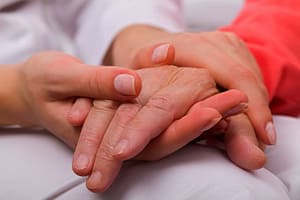Being a caregiver for a family member who is going through the cancer journey, can be challenging, and stress can become a part of the caretaker’s daily life.
Feeling stress when one catches oneself unable to meet the needs or expectations of someone going through their cancer journey, is absolutely natural. So don’t leave them alone with this reality. It is worth remembering, that to someone with a cancer diagnosis, caregivers are their significant others, who are vital and instrumental in helping them to manage day-to-day life, and usually someone who is playing a vital role in their care.

Caregiver is someone who provides physical and emotional care to someone with cancer – but they aren’t paid to do this work. Today, people with cancer often receive most of their care as outpatients, which means they do not stay in the cancer centre or hospital. They are able and want to spend more time at home. Caregivers who provide this care at home are usually the partner or spouse, parent, adult child or close friend of the person with cancer.
Caring for someone with cancer isn’t easy. It often involves taking on many new, important responsibilities. It can go on for a long time – many months or years. It’s not something you expect or plan ahead for.
The responsibility can be overwhelming and stressful, but it can also be very rewarding. Most caregivers agree that the experience changes their lives.
Home care services such as having a nurse or personal support worker come to your home to help with medicines and bathing may be available where you live. Knowing about services that can help you if you need it can make you more confident of your decision. Home care staff can teach you caregiving tasks like how to turn someone in bed.
It’s normal to be uncomfortable with the idea of giving medicines or giving physical care (such as bathing the person with cancer or helping them when they go to the bathroom). Maybe you’re worried about juggling the responsibilities you already have at home or work with this new role. Be honest with yourself about what you can realistically do and what you are most comfortable doing.
The role – It’s important that you, the person with cancer and the healthcare team know what you will be doing as a caregiver. You also need to let people know what you aren’t comfortable doing as a caregiver and where other help will be needed.
Caregiving can be a very intense and tiring job. While you’re caregiving, along with everything else you have to do every day, you may forget to take care of yourself. But it’s very important to make sure that you take time for yourself.
Cancer survivors need time to accept the new reality, which is never easy. Usually, in addition to cancer treatment, patients get mental health support from the health system; however, more frequently than ever, the loved ones are left to deal with a new reality alone.


